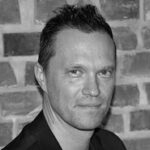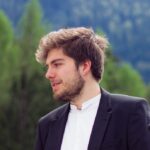
Dr. Janine Hacker is an assistant professor at the Department of Information Systems & Computer Science at the Business School of the University of Liechtenstein. She has a multidisciplinary background, having studied International Management, European Business, and Information Systems. Janine Hacker’s research interests lie in the field of social software, knowledge management, digital collaboration, virtual teams, e-learning, and the future of work. During the COVID-19 pandemic, together with colleagues from the Institute of Information Systems, Janine Hacker has initiated a study on the use of web-conferencing systems during the crisis. Results of the study show that web-conferencing systems helped people to keep up their leisure activities during the pandemic, making music together online being one of them. This fact as well as the overwhelming number of new virtual musical formats, such as streaming concerts or split-screen videos, inspired Janine Hacker to participate in digital choir projects and to look into the use of digital collaboration tools in order to make music together online.
With regard to the ERASMUS+ project, Janine Hacker will bring in her expertise regarding virtual collaboration and social interaction in virtual environments in order to develop principles for fostering technology acceptance and togetherness in online choir rehearsals.

Prof. Dr. Heike Henning is Professor of Instrumental and Vocal Pedagogy at the Mozarteum, Department of Music Education Innsbruck. She is also the director of the Centre for Choral Pedagogical Research and Practice (ZECHOF) in Innsbruck. Heike Henning has taught music, instrumental and vocal pedagogy as well as children’s choir conducting at various German universities and music colleges. As a children’s choir director and choir teacher, she is an internationally sought-after expert. Her research focuses on choral pedagogical practice as well as instrumental and vocal didactic development research.
Concerning this project, Heike Henning has started to conduct online choir rehearsals and initiated a number of digital projects (e.g. “Open choir” sessions, split-screen videos) during the pandemic. As conductor of several choirs, she is well aware of the opportunities and limitations of online choir rehearsals. Heike Henning has a strong interest in creating choral pedagogical guidelines for online rehearsals so as to fully leverage the potentials of online choirs. On the one hand, this is an important prerequisite to improve access to choirs. On the other hand, it contributes to establishing the field of digital choral pedagogy and represents groundwork for creating new forms of aesthetic expression.
 Prof. Dr. habil. Alexander Carôt is a full professor in media computer science at Anhalt University of Applied Sciences (HSA). He received a German engineering diploma within an interdisciplinary study program in order to combine the arts and technology in 2004. Motivated by the passion for remote music performances with musicians in different places, he completed his PhD in computer science in 2009 at the University of Lübeck/Germany. In 2010, he received his state doctorate (Habilitation) in the field of audio communication at the Technical University of Berlin/Germany in 2021. Since 2005, Alexander Carôt has been developing Soundjack, a real-time communication software system providing any quality- and latency- relevant parameter to the user. Soundjack has enabled numerous distributed online music rehearsals, performances and teachings all over the world. Besides continuously improving Soundjack in terms of signal latency, quality and usability, Alexander Carôt is playing bass in various remote music ensembles. In his recent research and development activities, he is focuses on novel multimodal delay-optimised transmission approaches especially in the context of music ensembles with up to 100 participants and in improving user experience and reducing barriers for non tech savvy users.
Prof. Dr. habil. Alexander Carôt is a full professor in media computer science at Anhalt University of Applied Sciences (HSA). He received a German engineering diploma within an interdisciplinary study program in order to combine the arts and technology in 2004. Motivated by the passion for remote music performances with musicians in different places, he completed his PhD in computer science in 2009 at the University of Lübeck/Germany. In 2010, he received his state doctorate (Habilitation) in the field of audio communication at the Technical University of Berlin/Germany in 2021. Since 2005, Alexander Carôt has been developing Soundjack, a real-time communication software system providing any quality- and latency- relevant parameter to the user. Soundjack has enabled numerous distributed online music rehearsals, performances and teachings all over the world. Besides continuously improving Soundjack in terms of signal latency, quality and usability, Alexander Carôt is playing bass in various remote music ensembles. In his recent research and development activities, he is focuses on novel multimodal delay-optimised transmission approaches especially in the context of music ensembles with up to 100 participants and in improving user experience and reducing barriers for non tech savvy users.
In this project, Alexander Carôt brings in in-depth expertise regarding networked music systems. As such, he will outline possibilities, challenges and future scenarios as well as elicit requirements in order to build a realistic vision for the distributed choir use case from a technological point of view.
MM ag. Markus Rohregger BA has a multidisciplinary background as a conductor, teacher and researcher. He is a graduate of the University Mozarteum Salzburg and the University of Innsbruck, where he completed degrees in music & instrumental education as well as Latin. Currently, he is pursuing a degree in Orchestral & Choral Conducting at the prestigious Music University of Vienna (MDW).
ag. Markus Rohregger BA has a multidisciplinary background as a conductor, teacher and researcher. He is a graduate of the University Mozarteum Salzburg and the University of Innsbruck, where he completed degrees in music & instrumental education as well as Latin. Currently, he is pursuing a degree in Orchestral & Choral Conducting at the prestigious Music University of Vienna (MDW).
As a recipient of the „ProScientia“ Austrian scholarship program, Markus Rohregger has demonstrated a remarkable passion for interdisciplinary research and has exhibited exceptional potential in breaking down the barriers that limit the scope of a particular field. Over the past decade, he has gained a wealth of experience as a conductor of several choirs, ensembles, and orchestras.
Throughout the challenging COVID-19 pandemic, Markus Rohregger adapted his teaching methods to the digital formats that were feasible during the times of social distancing. As a music educator, he employed his pedagogical expertise to support his students‘ learning, while effectively navigating the new technological landscape.
Currently, Markus Rohregger is contributing to the ongoing ERASMUS+ research project with his unique experiences and knowledge as a conductor and teacher. His research will focus on the pedagogical and didactical aspects of online choir rehearsals and performances.
 Susanne Häfner, M.A. is a research associate at the Department of Computer Science & Languages at Anhalt University of Applied Sciences (HSA) as well as an marketing assistant to the dean’s office. She is passionate about singing at a amateur level in duets or in the staff choir – sadly without an audience. She graduated in media and communication studies as well as German studies; she pursues a media science approach in the project.
Susanne Häfner, M.A. is a research associate at the Department of Computer Science & Languages at Anhalt University of Applied Sciences (HSA) as well as an marketing assistant to the dean’s office. She is passionate about singing at a amateur level in duets or in the staff choir – sadly without an audience. She graduated in media and communication studies as well as German studies; she pursues a media science approach in the project.